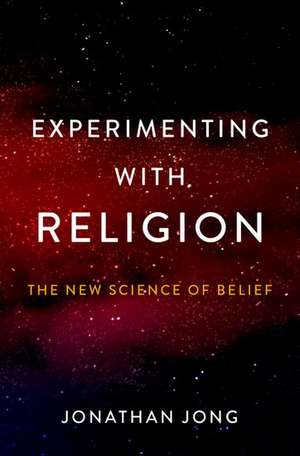Experimenting with Religion: The New Science of Belief
Autor Jonathan Jongen Limba Engleză Hardback – 9 iun 2023
Preț: 135.72 lei
Preț vechi: 155.17 lei
-13% Nou
Puncte Express: 204
Preț estimativ în valută:
25.98€ • 28.23$ • 21.84£
25.98€ • 28.23$ • 21.84£
Carte disponibilă
Livrare economică 20-26 martie
Livrare express 15-21 martie pentru 45.81 lei
Preluare comenzi: 021 569.72.76
Specificații
ISBN-13: 9780190875541
ISBN-10: 0190875542
Pagini: 200
Dimensiuni: 236 x 164 x 20 mm
Greutate: 0.43 kg
Editura: Oxford University Press
Colecția OUP USA
Locul publicării:New York, United States
ISBN-10: 0190875542
Pagini: 200
Dimensiuni: 236 x 164 x 20 mm
Greutate: 0.43 kg
Editura: Oxford University Press
Colecția OUP USA
Locul publicării:New York, United States
Recenzii
Experimenting with Religion is a great introduction to the way psychologists ask and answer questions. It's a well written, sophisticated ramble through some of our knottiest problems in social science. It's suitable for an introductory class on psychology—and for curling up with in front of a fire.
A breezy, friendly, wise book that gives an understanding of what it is that scientists studying religion spend their time doing. This is the book I will be giving my family so they can see why I love my job.
Jong's Experimenting with Religion is an enlightening meditation on the search for understanding. The science of religion offers an opportunity to apply the best methodologies available to gain insight into how and why people believe. Unexpectedly, the subjects of Jong's story are not really the participants in the experiments, but the scientists conducting them. How do scientists come to believe how people believe? Jong exposes the uncertainty and challenge of gaining true insight on religion, and the natural world more generally, with a personal and arresting account of scientists doing their daily work. Even the most rigorous science will produce a slow walk toward the truth with plenty of false starts along the way. That isn't to suggest that the journey isn't worth it, just that we should do so with humility and recognition that what we know and what we think we know are not the same thing.
Experimenting with Religion provides a unique view into the labs—and minds—of psychologists who study religion. Whether or not you are interested in religion, this is the perfect book for anyone who wants to know how psychologists know what they know, and also how to make sense of scientific research that is sometimes confusing and contradictory.
Experimenting with Religion is an enjoyable, fascinating book that informs and teaches through real-world examples and stories. It should serve as an excellent text and conversation- starter for scholars of religion - students, teachers and researchers - from any of our disciplines.
A breezy, friendly, wise book that gives an understanding of what it is that scientists studying religion spend their time doing. This is the book I will be giving my family so they can see why I love my job.
Jong's Experimenting with Religion is an enlightening meditation on the search for understanding. The science of religion offers an opportunity to apply the best methodologies available to gain insight into how and why people believe. Unexpectedly, the subjects of Jong's story are not really the participants in the experiments, but the scientists conducting them. How do scientists come to believe how people believe? Jong exposes the uncertainty and challenge of gaining true insight on religion, and the natural world more generally, with a personal and arresting account of scientists doing their daily work. Even the most rigorous science will produce a slow walk toward the truth with plenty of false starts along the way. That isn't to suggest that the journey isn't worth it, just that we should do so with humility and recognition that what we know and what we think we know are not the same thing.
Experimenting with Religion provides a unique view into the labs—and minds—of psychologists who study religion. Whether or not you are interested in religion, this is the perfect book for anyone who wants to know how psychologists know what they know, and also how to make sense of scientific research that is sometimes confusing and contradictory.
Experimenting with Religion is an enjoyable, fascinating book that informs and teaches through real-world examples and stories. It should serve as an excellent text and conversation- starter for scholars of religion - students, teachers and researchers - from any of our disciplines.
Notă biografică
Jonathan Jong is an Assistant Professor at Coventry University, prior to which he was a postdoctoral researcher at the Institute for Cognitive and Evolutionary Anthropology at the University of Oxford. He is also a Research Associate at the Ian Ramey Centre for Science and Religion and St Benet's Hall, Oxford, and a Fellow of the International Society for Science and Religion.
